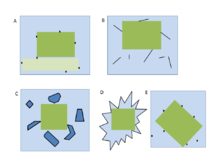
In computational geometry, the largest empty rectangle problem, maximal empty rectangle problem or maximum empty rectangle problem, is the problem of finding a rectangle of maximal size to be placed among obstacles in the plane. There are a number of variants of the problem, depending on the particularities of this generic formulation, in particular, depending on the measure of the "size", domain (type of obstacles), and the orientation of the rectangle.
The problems of this kind arise e.g., in electronic design automation, in design and verification of physical layout of integrated circuits.
A maximal empty rectangle is a rectangle which is not contained in another empty rectangle. Each side of a maximal empty rectangle abuts an obstacle (otherwise the side may be shifted outwards, increasing the empty rectangle). An application of this kind is enumeration of "maximal white rectangles" in image segmentation R&D of image processing and pattern recognition. In the contexts of many algorithms for largest empty rectangles, "maximal empty rectangles" are candidate solutions to be considered by the algorithm, since it is easily proven that, e.g., a maximum-area empty rectangle is a maximal empty rectangle.
Classification
In terms of size measure, the two most common cases are the largest-area empty rectangle and largest-perimeter empty rectangle.
Another major classification is whether the rectangle is sought among axis-oriented or arbitrarily oriented rectangles.
Special cases
Maximum-area square
The case when the sought rectangle is an axis-oriented square may be treated using Voronoi diagrams in metrics for the corresponding obstacle set, similarly to the largest empty circle problem. In particular, for the case of points within rectangle an optimal algorithm of time complexity is known.
Domain: rectangle containing points
A problem first discussed by Naamad, Lee and Hsu in 1983 is stated as follows: given a rectangle A containing n points, find a largest-area rectangle with sides parallel to those of A which lies within A and does not contain any of the given points. Naamad, Lee and Hsu presented an algorithm of time complexity , where s is the number of feasible solutions, i.e., maximal empty rectangles. They also proved that and gave an example in which s is quadratic in n. Afterwards a number of papers presented better algorithms for the problem.
Domain: line segment obstacles
The problem of empty isothetic rectangles among isothetic line segments was first considered in 1990. Later a more general problem of empty isothetic rectangles among non-isothetic obstacles was considered.
Generalizations
Higher dimensions
In 3-dimensional space, algorithms are known for finding a largest maximal empty isothetic cuboid problem, as well as for enumeration of all maximal isothetic empty cuboids.
See also
References
- ^ A. Naamad, D. T. Lee and W.-L. Hsu (1984). "On the Maximum Empty Rectangle Problem". Discrete Applied Mathematics. 8 (3): 267–277. doi:10.1016/0166-218X(84)90124-0.
- "Search Google Scholar for "largest empty rectangle" term usage".
- "Search Google Scholar for "maximal empty rectangle" term usage".
- "Search Google Scholar for "maximum empty rectangle" term usage".
- Jeffrey Ullman (1984). "Ch.9: Algorithms for VLSI Design Tools". Computational Aspects of VLSI. Computer Science Press. ISBN 0-914894-95-1. describes algorithms for polygon operations involved in electronic design automation (design rule checking, circuit extraction, placement and routing).
- Baird, H. S., Jones, S. E., Fortune, S.J. (1990). "Image segmentation by shape-directed covers". [1990] Proceedings. 10th International Conference on Pattern Recognition. Vol. 1. pp. 820–825. doi:10.1109/ICPR.1990.118223. ISBN 0-8186-2062-5. S2CID 62735730.
{{cite book}}: CS1 maint: multiple names: authors list (link) - Alok Aggearwal, Subhash Suri (1987). "Fast algorithms for computing the largest empty rectangle". Proceedings of the third annual symposium on Computational geometry - SCG '87. pp. 278–290. doi:10.1145/41958.41988. ISBN 0897912314. S2CID 18500442.
- B. Chazelle, R. L. Drysdale III and D. T. Lee (1984). "Computing the largest empty rectangle". STACS-1984, Lecture Notes in Computer Science. Lecture Notes in Computer Science. 166: 43–54. doi:10.1007/3-540-12920-0_4. ISBN 978-3-540-12920-2.
- ^ Thiagarajan, P. S. (23 November 1994). "Location of Largest Empty Rectangle among Arbitrary Obstacles". Foundations of Software Technology and Theoretical Computer Science. Springer. p. 159. ISBN 9783540587156.
- Subhas C Nandy; Bhargab B Bhattacharya; Sibabrata Ray (1990). "Efficient algorithms for identifying all maximal isothetic empty rectangles in VLSI layout design". Proc. FST & TCS – 10, Lecture Notes in Computer Science. Lecture Notes in Computer Science. 437: 255–269. doi:10.1007/3-540-53487-3_50. ISBN 978-3-540-53487-7.
- S.C. Nandy; B.B. Bhattacharya (1998). "Maximal Empty Cuboids among Points and Blocks". Computers & Mathematics with Applications. 36 (3): 11–20. doi:10.1016/S0898-1221(98)00125-4.
 metrics for the corresponding obstacle set, similarly to the
metrics for the corresponding obstacle set, similarly to the  is known.
is known.
 , where s is the number of feasible solutions, i.e., maximal empty rectangles. They also proved that
, where s is the number of feasible solutions, i.e., maximal empty rectangles. They also proved that  and gave an example in which s is quadratic in n. Afterwards a number of papers presented better algorithms for the problem.
and gave an example in which s is quadratic in n. Afterwards a number of papers presented better algorithms for the problem.